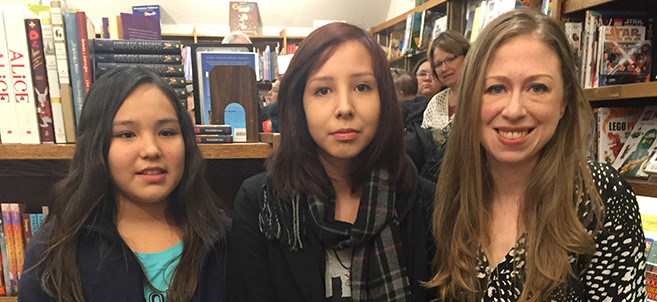
It’s not every day that you get a chance to meet the daughter of the President of the United States. Jennifer Thiesen, a programmer in Bemidji State University’s programming, networking and servers office, had that opportunity on Nov. 20, along with two members of the Girls Who Code club she founded at Bemidji State in the fall of 2014.
Theisen, along with 16-year-old Alise May and 14-year-old Diamond Cloud-Sayers, both from Red Lake, Minn., traveled to St. Paul, Minn. to meet Chelsea Clinton – daughter of former President Bill Clinton – at a signing of Clinton’s new book, “It’s Your World.”
The book, which aims to help people understand the world around them and show how anyone can make a difference, included a mention of Girls Who Code which focused on the “Ojibwe Language Helper” app devised by May and Cloud-Sayers. The children were invited to St. Paul’s Red Balloon Bookshop to meet Clinton, who was making the final stop on a 20-city tour to promote the book.
Girls Who Code is a non-profit program meant to inspire high-school aged girls to learn computing and coding skills and, ultimately, increase the number of women working in high-tech professions. BSU’s Girls Who Code club will begin meeting again in January 2016 and expects its membership to total nearly 30 girls for its second year. Nearly two dozen are expected to return from the program’s first year. Club members come from schools in the Bemidji area and many travel to Bemidji by bus from local communities such as Red Lake and Ponemah.
BSU’s Girls Who Code club is funded in part by a girlsBEST grant from the Women’s Foundation of Minnesota.
Excerpt from “It’s Your World”
“Another effort, led by the remarkable Reshma Saujani, is Girls Who Code, a nonprofit program that teaches female high school students how to code and mentors the young women in the program as they create their own innovative apps. Girls who’ve participated in Girls Who Code have created apps that help kids with autism learn through music, help users decide what items to recycle, help improve public safety by locking a phone’s texting function when a driver is going over fifteen miles per hour and even one to help girls learn self-defense. Alise and Diamond, members of the Chippewa tribe in Minnesota, created “Ojibwe Helper,” an app to help preserve their heritage and culture through teaching their traditional Ojibwe language to app users. Very cool. If you’re interested in learning more and applying, go to girlswhocode.com.”
Contact
• Jennifer Theisen; (218) 755-2110, jtheisen@bemidjistate.edu
Links
• Girls Who Code / Twitter
• Northern Minnesota Girls Who Code
• It’s Your World
• Red Balloon Bookshop
